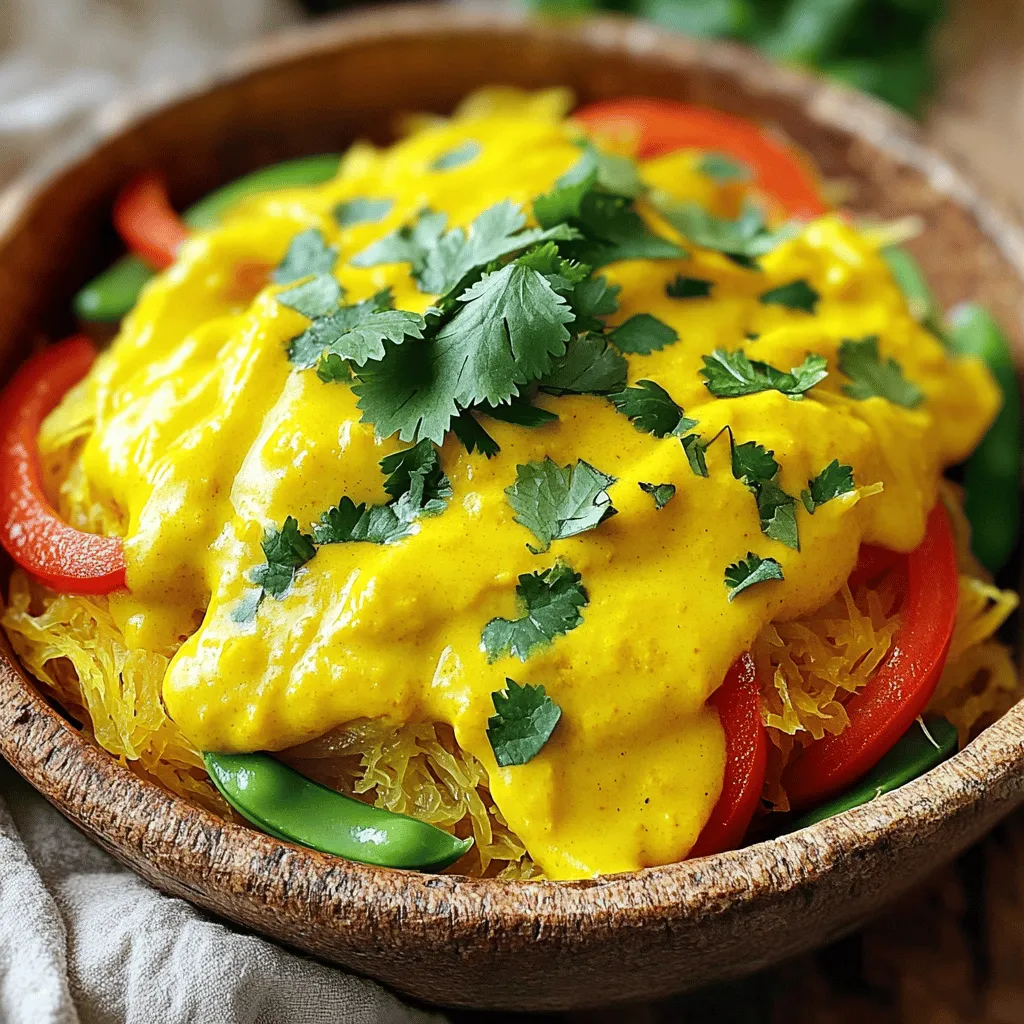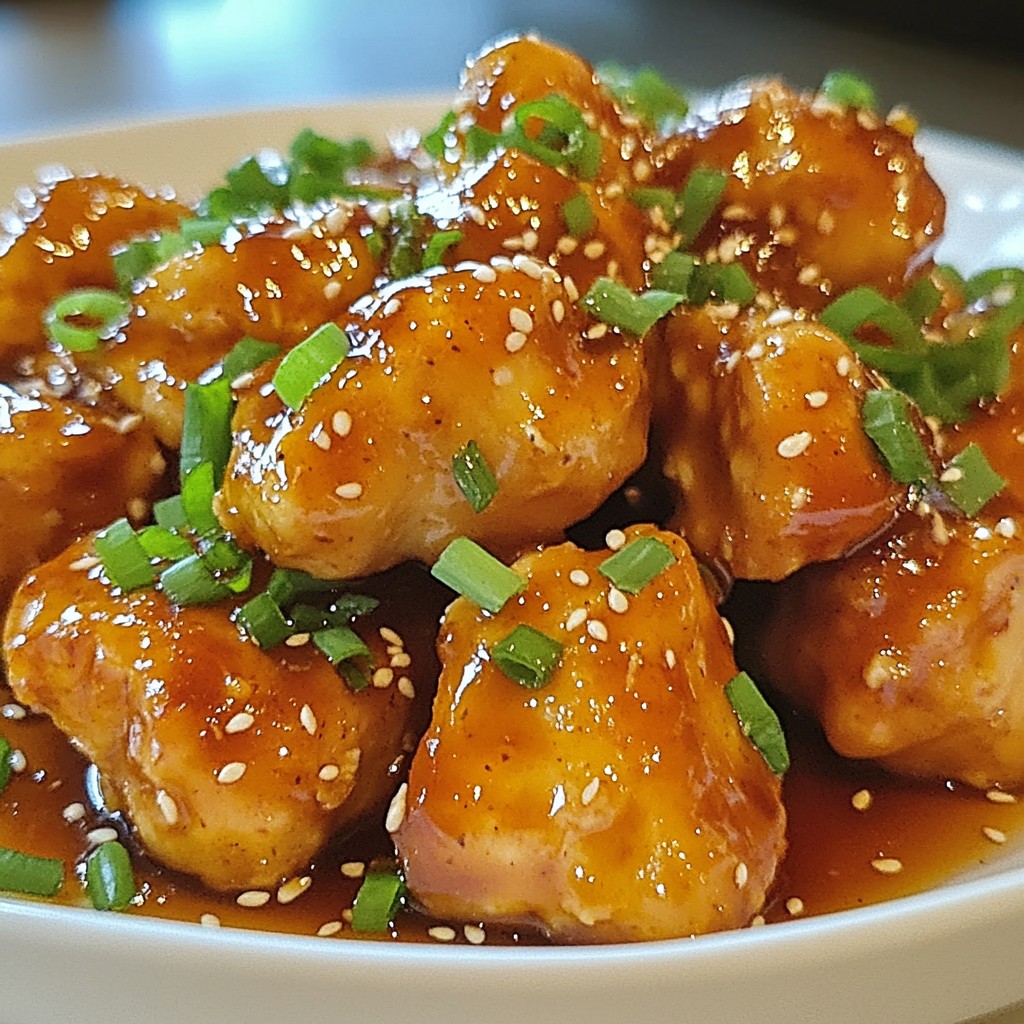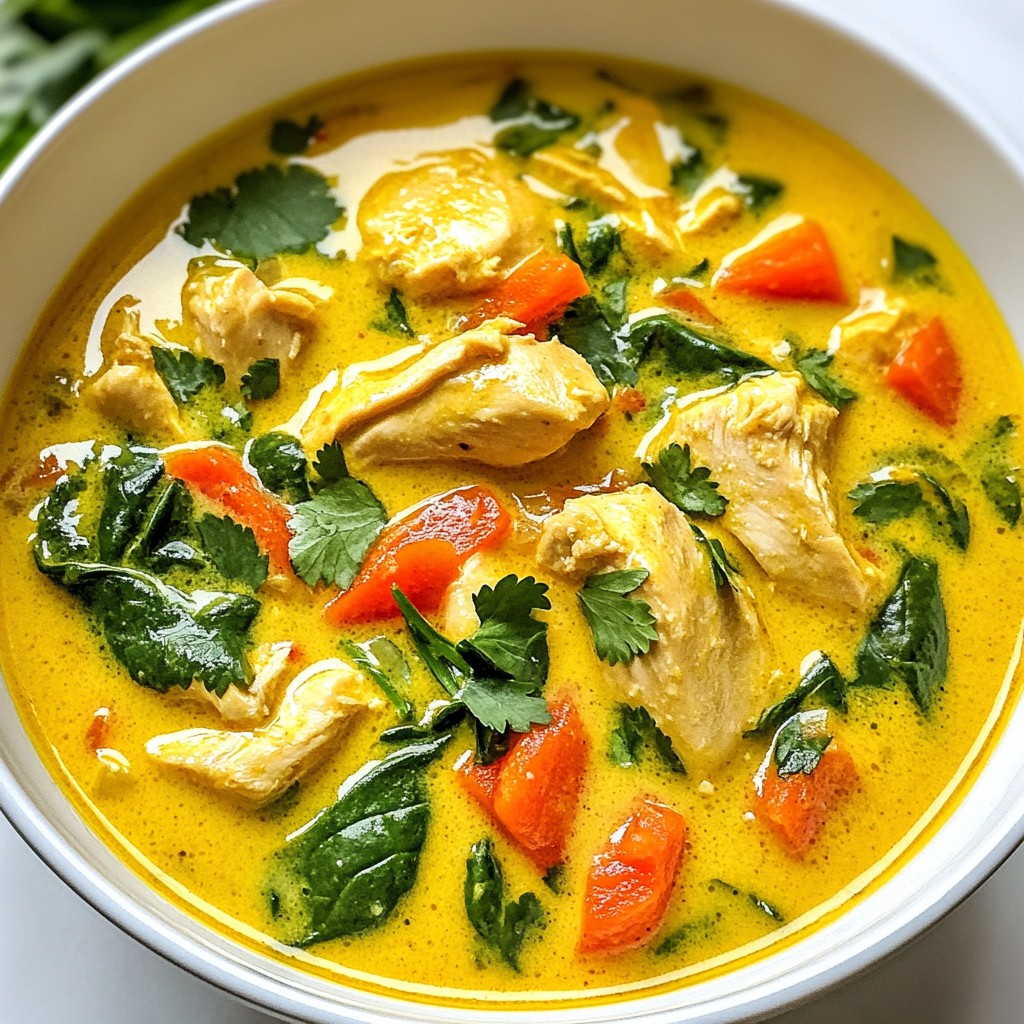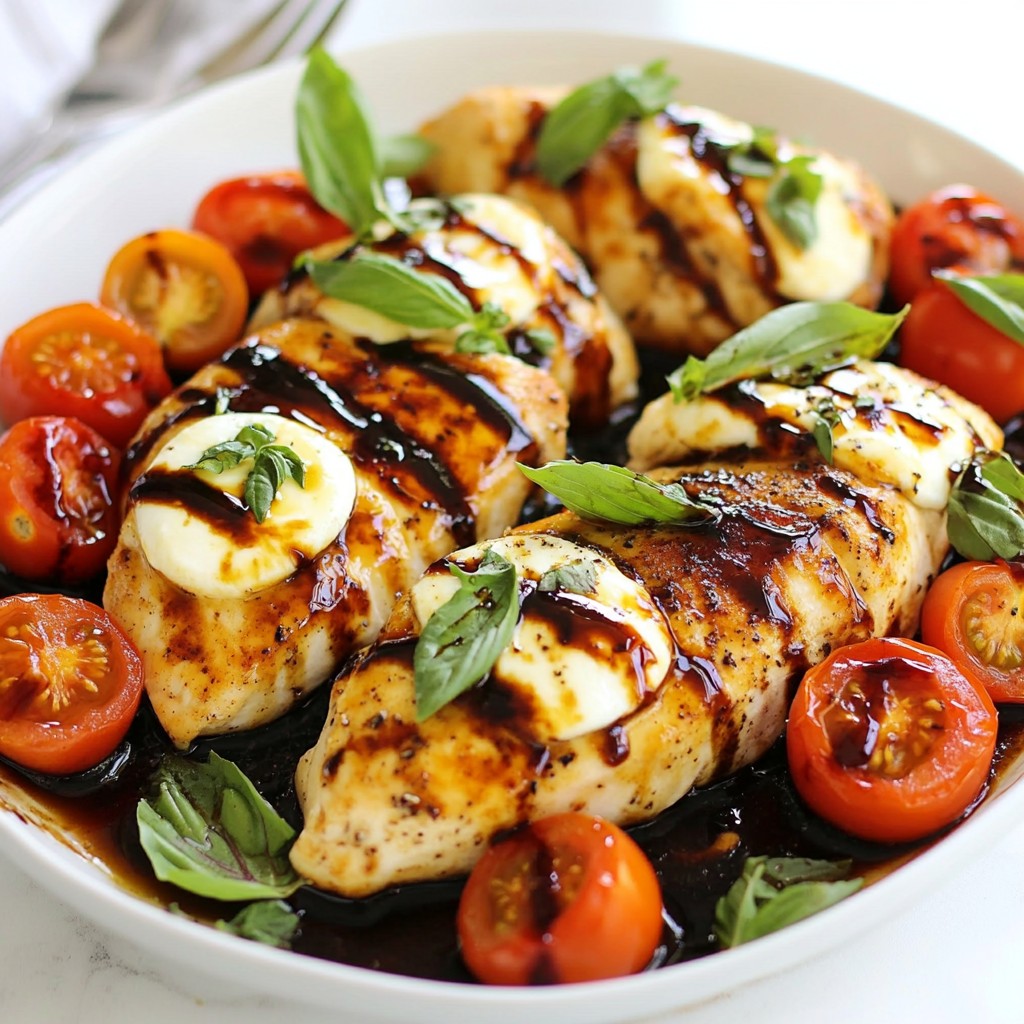Looking for a dish that’s both tasty and healthy? My Yellow Curry Spaghetti Squash is your answer! This vibrant recipe combines sweet spaghetti squash with fragrant yellow curry for a meal that’s packed with flavor and nutrients. In this post, I’ll guide you through simple steps to create this delicious dish, share cooking tips, and even suggest variations. Let’s transform your kitchen into a culinary adventure ready to impress!
Ingredients
Main Ingredients
– 1 medium spaghetti squash
– 1 tablespoon coconut oil
– 1 yellow onion, diced
– 2 cloves garlic, minced
– 1 tablespoon fresh ginger, grated
– 2 tablespoons yellow curry powder
– 1 can (400ml) coconut milk
– 1 cup vegetable broth
– 1 red bell pepper, sliced
– 1 cup sugar snap peas
– 1 tablespoon soy sauce (or tamari for gluten-free)
– Salt and pepper, to taste
– Fresh cilantro, for garnish
I love using spaghetti squash because it offers a fun, low-carb base for meals. The first step is to roast the squash. This brings out its natural sweetness. The coconut oil adds a rich flavor while sautéing the onion, garlic, and ginger. These three ingredients form a great flavor base for your curry.
The yellow curry powder is key. It adds warmth and depth to the dish. I always use fresh coconut milk for a creamy texture. It pairs perfectly with the vegetable broth, making a smooth sauce. The red bell pepper and sugar snap peas add color and crunch. They cook quickly, keeping their vibrant look.
For seasoning, I use soy sauce or tamari. This gives it a savory kick. Finally, fresh cilantro brightens the dish and adds a pop of color.
Step-by-Step Instructions
Preparing the Spaghetti Squash
– Preheat oven to 400°F (200°C).
– Cut the spaghetti squash in half and scoop out seeds.
– Drizzle with olive oil and sprinkle with salt and pepper.
– Place cut side down on a lined baking sheet and roast.
Roasting the squash takes about 40 minutes. You want it soft enough to shred easily. Once it’s done, let it cool a bit before you scrape out the strands. This squash will be your pasta base!
Making the Curry Sauce
– Heat coconut oil in a skillet over medium heat.
– Sauté diced onion until translucent.
– Add garlic and ginger; cook until fragrant.
– Stir in yellow curry powder; toast slightly.
This step builds the flavor. I love how the onion softens and mingles with garlic and ginger. It smells fantastic! The yellow curry powder gives the dish its warm color and rich taste.
Combining Ingredients
– Pour in coconut milk and vegetable broth.
– Simmer the mixture.
– Add bell pepper and sugar snap peas; cook until tender.
– Stir in soy sauce and season with salt and pepper.
Bring it all to a gentle simmer. The coconut milk makes it creamy while the broth adds depth. Toss in your veggies and let them soften while keeping their bright colors.
Serving the Dish
– Scrape roasted squash into spaghetti-like strands.
– Ladle curry sauce over strands.
– Garnish with fresh cilantro.
This is where it comes together! The squash strands act like noodles. Pour that delicious curry sauce over the top, and finish with fresh cilantro. It’s a feast for the eyes and the taste buds!
Tips & Tricks
Cooking Tips
– Ensure the squash is tender before removing from the oven.
– Adjust the spice level by varying the curry powder amount.
– Use fresh vegetables for vibrant color and flavor.
I find that a fork is your best friend when checking the squash. When it feels soft, it’s ready. If you like more heat, add extra curry powder. Start with a little, then taste before adding more. Fresh vegetables not only taste better but also make your dish look bright. Use colorful bell peppers or peas for the best results.
Serving Suggestions
– Serve with rice or quinoa for added texture.
– Top with roasted peanuts or cashews for crunch.
– Pair with a side salad for a complete meal.
I love to serve my yellow curry spaghetti squash with fluffy rice. It gives a nice bite that balances the soft squash. Roasted nuts add a satisfying crunch that makes each bite special. A fresh salad on the side makes the meal light and fresh. You can even drizzle a little lime juice on the salad for a zing!
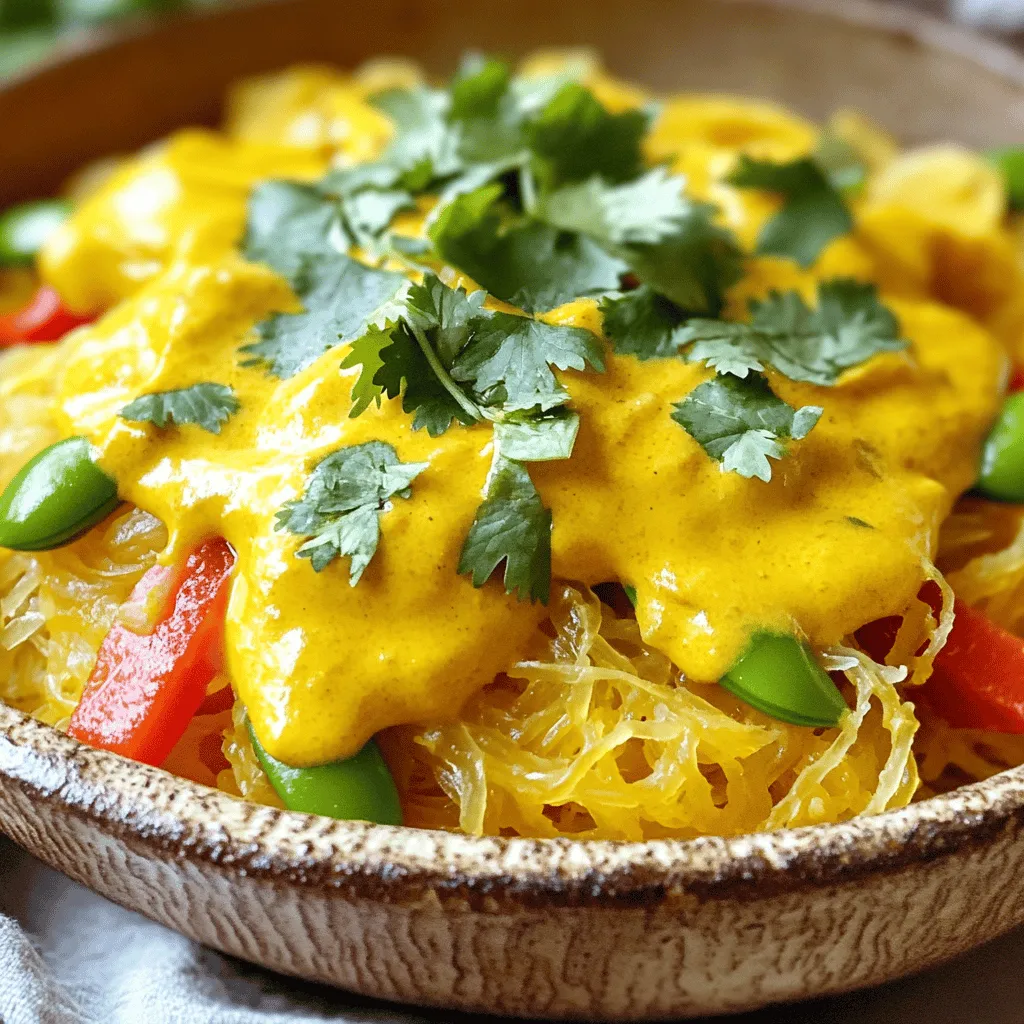
Variations
Vegetarian Options
You can make this dish vegetarian easily. Substitute vegetable broth with chickpea or lentil broth. This adds protein and flavor. You can also add more veggies. Carrots or zucchini work well. They add color and crunch.
Protein Boosters
Want to add more protein? Incorporate cooked chicken, tofu, or shrimp. These options make the dish heartier. Adjust cooking times as needed. You want the protein cooked through but not overdone.
Flavor Enhancements
To change the flavor, try different types of curry paste. Each type offers a unique taste. For a citrus twist, add lime juice or zest. This brightens the dish and enhances the curry flavor.
Storage Info
Storing Leftovers
After enjoying your yellow curry spaghetti squash, store any leftovers in an airtight container. This keeps them fresh for up to 3 days in the fridge. When you’re ready to eat again, reheat the curry gently on the stove or in the microwave. This helps retain its flavor and texture.
Freezing Recommendations
If you want to save some for later, freeze the curry sauce separately. It stays good for up to 2 months. Just make sure to let it cool before freezing. Avoid freezing the spaghetti squash, as its texture may change when thawed. This can make it mushy and less enjoyable. Enjoy the fresh taste when you can!
FAQs
Can I make this recipe gluten-free?
Yes, by using tamari instead of soy sauce. Tamari is a great gluten-free option. It has a similar taste and works well in this recipe.
How do I know when spaghetti squash is cooked?
The flesh should be tender and easily shredded with a fork. You want it to have a nice, soft texture. If it feels hard, give it more time in the oven.
Can I use other types of squash?
Yes, but cooking times may vary based on the squash type. Acorn or butternut squash can work. Just check for doneness by testing with a fork.
What is the nutritional value per serving?
Each serving has about 250 calories. It contains 10 grams of fat and 35 grams of carbs. This dish is filling and healthy, with many vitamins from the veggies.
Where does yellow curry originate?
Yellow curry comes from Thailand. It blends spices like turmeric, cumin, and coriander. Each region adds its twist, making it unique and diverse. You can find variations in many Asian cuisines.
This recipe showcases a simple, tasty dish using spaghetti squash and curry sauce. You learned how to prepare and combine fresh ingredients for a healthy meal. Remember to adjust spices to fit your taste and explore variations for more flair. You can store leftovers in the fridge or freeze the sauce for later. Cooking can be fun and creative, so don’t be afraid to experiment with your ingredients. Enjoy your time in the kitchen making this delightful dish!
